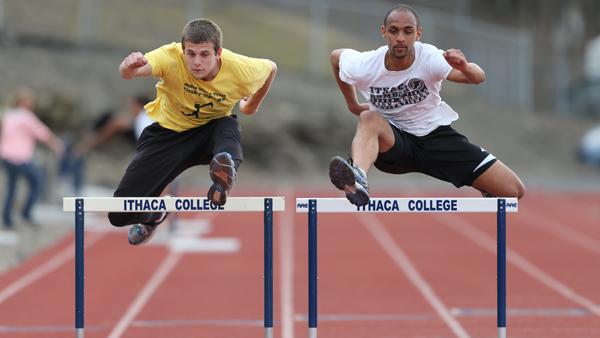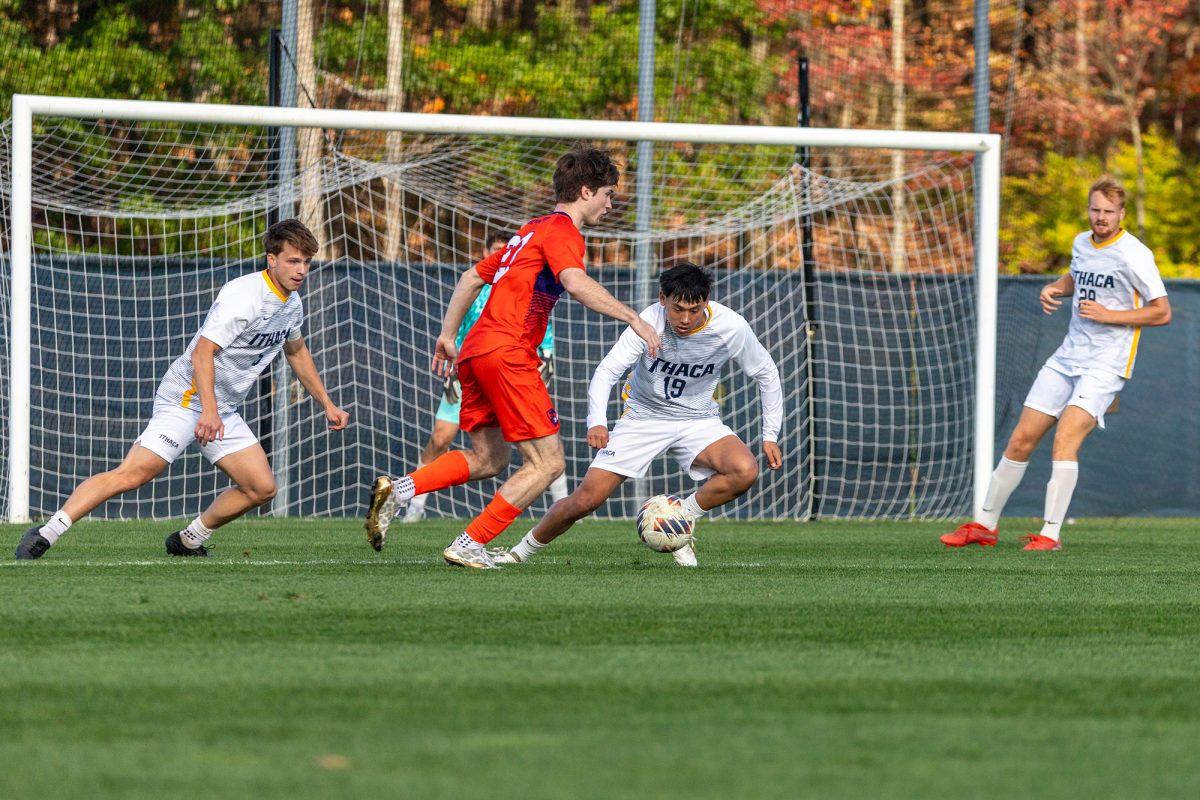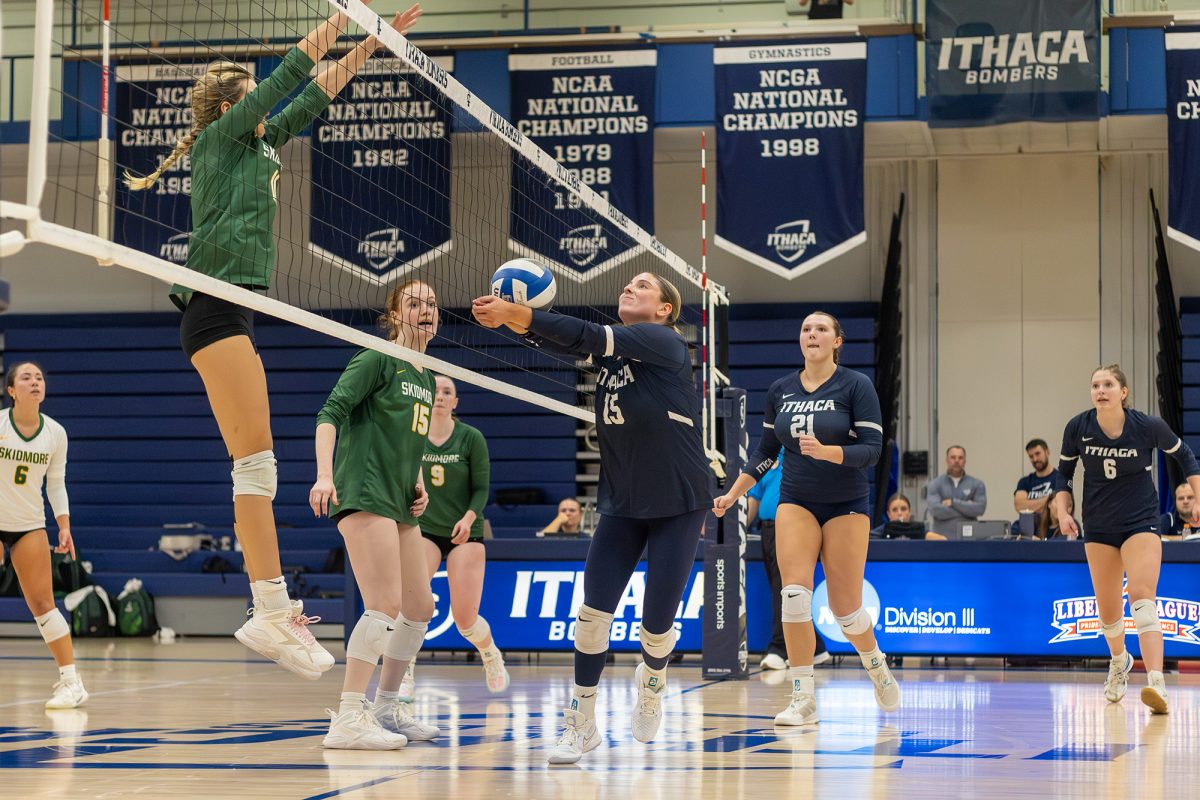A decathlon is a two-day, 10-event competition that requires the participants to compete in both running and field events. This event is different in that it only takes place four to five times in a given season. Senior decathletes Rad Arrindell and Alec Svoboda are more than just teammates, they’re roommates. Track and field beat writer Haley Costello breaks down the numbers that play a role in the duo’s competition.
2
Joined together during the 2012 season for the first time as the team’s only two decathletes, Svoboda and Arrindell have formed a true teammate bond.
When entering Ithaca College, Svoboda was not interested in competing in track after being a strong pentathlon competitor in high school. But after a few months, Svoboda said, he decided he could not keep himself away from the track.
“I started in 10th grade with the pentathlon and actually joined track a little late [in college], because I wasn’t planning on doing it at first,” he said. “But I started doing multi right away, because that’s all I did in high school, and I loved it.”
On the other hand, as a freshman, Arrindell joined the track and field team right away, competing in both the indoor and outdoor seasons.
He began his career as a hurdler and jumper, but limited himself to just hurdling in his sophomore season. He competed in two pentathlons during his freshman indoor season but during outdoor only participated in high jump and hurdles. He finally joined Svoboda in the decathlon his junior year of competition.
With the extensive amount of time they spend together on and off the track, Svoboda did not hesitate to bring Arrindell in as a roommate after one of his roommates decided to study abroad this semester.
Arrindell said living with Svoboda gives them an advantage on the track by teaching them skills that help each other prepare for competition days.
“From spending all of our time practicing and living together, we know how to say the things we need to hear, so it makes communicating a lot easier and effective,” Arrindell said.
While they may say things the other does not want to hear, Head Coach Jim Nichols said the IC decathletes know that pushing each other is the key to getting better.
“There’s definitely no animosity whatsoever,” Nichols said. “It’s a positive pushing to make each other better, because they had the realization if their training partner is better, that’s going to help them to be better.”
But communication is just one piece needed for the decathletes to push themselves through their two days of competition. To begin this process, Svoboda said the Bomber duo arrives two hours early to begin a warm up for each day of competition.
“We do a run for 15 minutes, then we lay down and relax for 45 minutes, and then we get up and get our real warm up,” he said. “It’s for our benefit to get our bodies ready and to get mentally ready to compete.”
10
After the warm up, the Blue and Gold team begins their lineup of events, totaling 10 over the two-day span.
On the first day, both participants will compete in the 100-meter dash, long jump, shot put, high jump and the 400-meter dash. Then the pair continues onto day two, where they encounter the 110-meter hurdles, the discus throw, the pole vault, javelin throw and the 1,500-meter run.
Over the two day span, Arrindell said, the key to excelling in all events is to stay concentrated on the current event and allow the body to take control during the performance.
“A lot of it is muscle memory for us, so sometimes the best thing to do is shut down your mind and let [your body] take over,” Arrindell said. “We focus on exactly what we are doing at that time, and we don’t think about the future or the past.
30
To allow the decathletes to perform at the highest level possible, the events are also separated by 30-minute increments. The time blocks begin after the completion of the event by the final competitor and give both Svoboda and Arrindell the time to rest before their next event.
To determine a winner, the decathletes performances are assessed in points through benchmark levels.
1
Of all of the events, one in particular requires extra training for both Svoboda and Arrindell: the pole vault. With the newness of the event combined with the necessary technique, Svoboda said the Bomber team requires two practices per week on pole vault.
“We spend a lot of time on pole vault, because neither one of us had done that before we got here,” Svoboda said. “It’s a really technical event that takes a lot of training to get better at it, so we spend a lot of time on it.”
In addition to its pole vault training, the South Hill duo uses a rigorous schedule to fit in training for 10 events per week. Arrindell said a typical day’s practice lasts three to five hours for the decathlete and could entail javelin, long jump, hurdle practice and vault training.
The squad also works to gain mental strength each week with various workouts provided by the coaches. Svoboda said both he and Arrindell use mental strength exercises to teach themselves to overcome the struggles of five-event days.
600
“We do specific running workouts that are geared for mental strength and when your body is getting tired and we need to keep on going,” he said. “We do a 600-meter workout, which is geared to make us pick up the pace each time, even if you want to slow down.”
Senior captain David Geary said the decathlete pair uses practice time to really develop their skills, which gives them the ability to produce during competition.
“When it comes to training, it is dedication and consistency,” he said. “You can be motivated on days when you’re competing, but if you aren’t when you are practicing, you’re not going to produce the results that you want, but they do great work at practice day in and day out.”
4,020
When totaling the amount of time spent together on the track and in their house, the team spends 31 hours from Monday to Thursday and 36 hours between Friday and Sunday, giving them a combined 4,020 minutes together per week.
The 4,020 minutes will grow even longer as the season continues, but Arrindell said that does not matter. The competition may be tough, but when paired with their strong friendship, falling behind on the track is not an option.
“My favorite part is the competition and the talk we have between each other,” he said. “We are roommates, and I consider Alec my best friend at school, so we don’t let each other slack off or slide by, and we see who can dominate in each event.”







